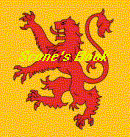


 |


 |

I am pleased to present the Clan MacLeod of Harris, the clan of Tormod, son of Leod and brother of Torquil.....also my cousin clan.....
Clandsmen's Crest: A bull's head, cabossed sable, between two flags, gules, staves of the first.
Moto: Hold Fast.
Old Motto: Muros aheneus esto (Be then a wall of brass.)
Gaelic Name: MacLeoid.
Origin of Name: Gaelic MacLeoid (son of Leod, from Norse ljot, ugly)
Badge: Juniper
Pipe Music: MacLeod's Praise.
MacCrimmon, MacLeod's Own Pipers
ORIGINAL SEPTS OF CLAN MacLEOD OF HARRIS:
Beaton, Bethune, Beton, Grimmond, Harold, Harold, MacAndie, MacCaig, MacClure, MacCrimmon, MacCuaig, MacHarold, MacLure, MacRaild, MacWilliam, Norman, Normand, Williamson
[All Mac's and Mc's is Gaelic and means "son of" so they are spelled (here)in lower and uppercase letters so that you can see the name correctly. All names with 'son' is Norse for "son of". There are variations of the original septs names. From the Viking name Tormod (the eldest of Leod's sons].
Happy hunting - hope you find your clan. A close spelling should be looked into as many records were verbal and whoever wrote them down may have changed the spelling.
The Clan descends from Leod, son of Olaf the Black, who lived in the 13th century and nephew of Magnus (the 13th century), last of the Norse Kings of the Isle of Man. Leod was fostered by Paul Balkasson, Sheriff of Skye, and about 1220 married the daughter and heriess of MacRaild, thus becoming owner of her lands and the Castle of Dunvegan.
Leod had four sons, the eldest, Tormod (Norman), inherited Dunvegan and and the Isle of Harris, becoming chief of these lands and adopting the title MacLeod of Dunvegan or MacLeod of MacLeod. The another son, Torquil, inherited Lewis, Rassay,Assynt, Waternish and a portion of Skye, along with territory on the Western shore of Scotland. They became known as the MacLeods of Lewis. The bulk of both clans were Norse-celtic stock. This branch (Lewis) eventually failed to issue in the male line, and having most of their men to war, thus passing descent to the MacLeods of Raasay.
The MacLeods served under the Lords of the Isles, holding high rank. Throughout their history, the MacLeods have had many outstanding chiefs. When MacDonald lost the title Lord of the Isles, the MacLeods began to rise on their own, a strong Norse clan.
The Siol Tormod supported Bruce in the War of Independence and Malcolm, son of Tormod, received a charter from David II (King) about 1342 granting him lands in Glenelg. William, 5th of Gleneig, proved his able leadership by his victories over the Frasers and over the Lord of the Isles. His son John supported the Lord of the Isles at Harlaw in 1411. In 1498 King James IV granted to Alexander 8th the lands of Duirnish and Troternish, and in the charter, his father William 7th, was described as of 'Dunvegan Castle and lands.'
One of the most distinguished chiefs was Roderick 13th, the famous Rory Mor, who was knighted by King James VI in 1603. He died in 1626. He was held in high esteem by the clan and his death was the occasion of the famous piobaireachd "Rory Mor's Lament," composed by Patrick Mor MacCrimmon. The MacCrimmon's were 'the heritary pipers' of MacLeod.
The MacLeods supported Charles I and Charles II, and were present at the Battle of Worchester in 1652 when the clan to the number of 700 were almost wiped out. The memory of this event and the ingratitude of the King may be the reason for the MacLeods refraining from taking part in the Jacobite Risings. Sir Reginald, 24th chief, who died in 1935, was the last of the male line of the Dunvegan MacLeods, but his daughter is recognized as Flora, MacLeod of MacLeod. Dame Flora MacLeod of MacLeod, who died in 1977 aged 98, did much to publicize the clan by visiting clansfolk all over the world, helping to found clan societies in Canada, Australia, New Zealand and the United States.
The MacLeods of Assynt in Sutherland are considered by many to have been the "black sheep" of the family, for it was to Assynt that the noble Marquess of Montrose fled; and in 1650 after the battle at Carbisdale it was MacLeod of Assynt who betrayed him.
The bulk of the MacLeods were in the beginning, of native Celtic stock, which became intermarried with the Norse clans. Tormod's grandson, Malcolm (who was mentioned above) was awarded a charter of Glenelg territory by David II, and by marriage acquired this clan's large foothold in Skye, with its famed fortress of Dunvegan as the Chief's seat. Harris was held by MacLeods as vassals to Clan Donald until the Lords of the Isles were forfeited. Thereafter, clear of that entanglement they aided the MacLeans against MacDonalds. At Worchester in 1851, the clan lost so any men for Charles II that the other clans agreed to exonerate them from further conflicts. However, some went anyway!
Nancy MacCorkill, F.S.A.Scot USA
Clans Gunn, MacLeod, Wallace and Keith (Marshall).
Historian of the Ancient Scottish Clans
Author, Poet
 |
 RETURN TO FIRST PAGE, AWARDS AND SCOTTISH SHOPS
RETURN TO FIRST PAGE, AWARDS AND SCOTTISH SHOPS

|
 |
"All Rights Reserved 01/01/98 thru 2003 inclusive, N.MacCorkill" ©Page designed by Created by
Lord Lyons Office, Agent of the Queen
Standard Disclaimer
Dreamspinner©, Webmaster
"©All Rights Reserved for ©Scone's Scottish & Celtic Internet Book 01/01/2001, 2002, 2003 N MacCorkill©"